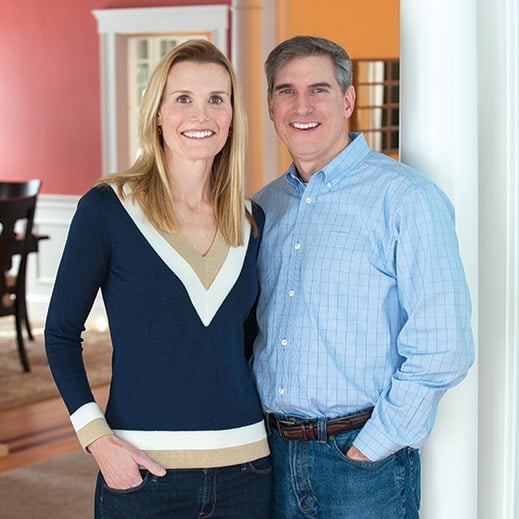Mick earned an MIT degree in mechanical engineering in 1987 and an MBA from Harvard Business School in 1996. He worked in high-tech product development at Motorola, Apple, and Webvan before becoming founder and CEO of Kiva Systems. Now an Amazon company, Kiva revolutionized the way e-commerce fulfillment centers pick, pack, and ship inventory, using mobile robots, mobile shelving, and complex adaptive algorithms. Tiffany earned a degree in nursing from the University of Kansas. They have four children, all under six, and enjoy international travel.

“We want MIT to continue to thrive as a force for U.S. competitiveness and to continue to transform the world, so we made a gift that supports the Department of Mechanical Engineering, a scholarship, and MIT baseball. MIT has been a central theme in my life. Fifteen years after graduating, I started a company with my roommate and seven longtime friends from our fraternity days. Our robotics idea built on the mechanical engineering skills we learned at MIT, which allowed us to visualize a product and bring it to life. In addition, Tiffany and I were both college athletes and believe that the competitive instincts, leadership, self-discipline, and teamwork skills you develop from sports are vital to success in business and everyday life. We love the idea of giving back to the Institute that helped us get to where we are today.”
Please consider your own gift to MIT.
For information, contact David Woodruff: 617-253-3990;
daw@mit.edu. Or visit giving.mit.edu.
Keep Reading
Most Popular
Large language models can do jaw-dropping things. But nobody knows exactly why.
And that's a problem. Figuring it out is one of the biggest scientific puzzles of our time and a crucial step towards controlling more powerful future models.
The problem with plug-in hybrids? Their drivers.
Plug-in hybrids are often sold as a transition to EVs, but new data from Europe shows we’re still underestimating the emissions they produce.
Google DeepMind’s new generative model makes Super Mario–like games from scratch
Genie learns how to control games by watching hours and hours of video. It could help train next-gen robots too.
How scientists traced a mysterious covid case back to six toilets
When wastewater surveillance turns into a hunt for a single infected individual, the ethics get tricky.
Stay connected
Get the latest updates from
MIT Technology Review
Discover special offers, top stories, upcoming events, and more.